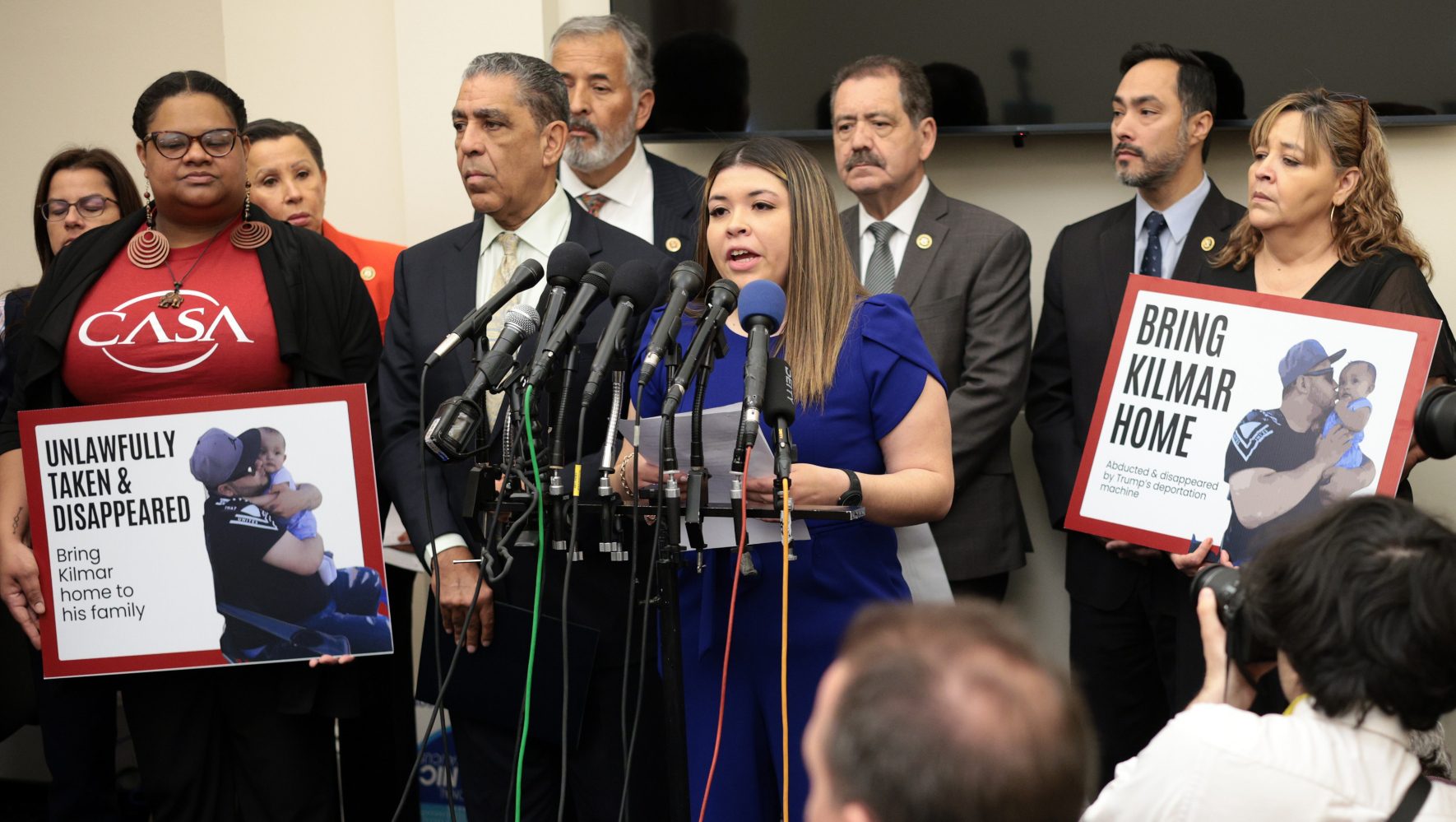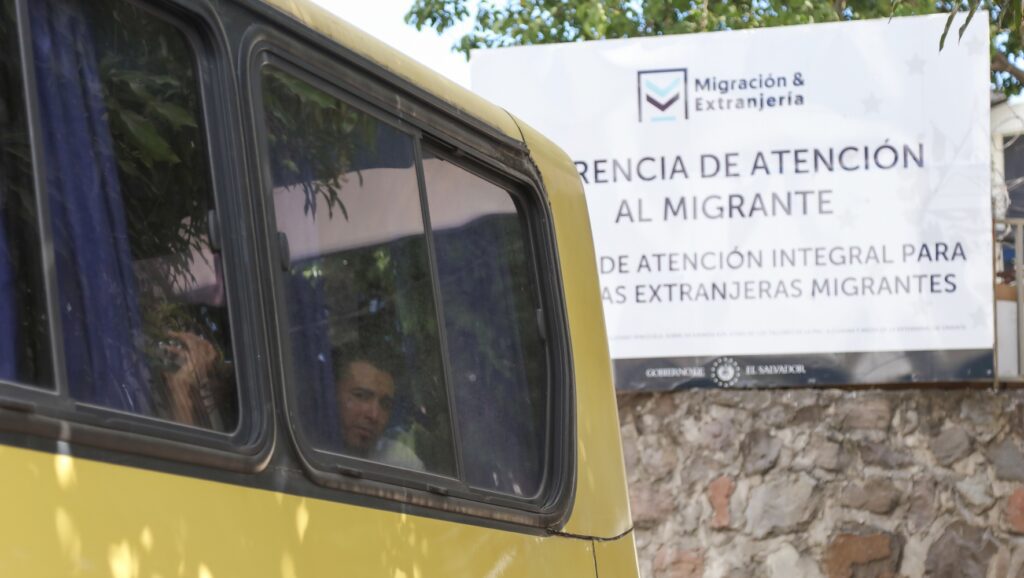
Desde su toma de posesión, el presidente Trump ha emitido cientos de órdenes ejecutivas, memorandos y proclamaciones, muchos de los cuales están directamente relacionados con la inmigración, el asilo y el reasentamiento de refugiados. Estas medidas, junto con otras órdenes ejecutivas y la legislación que se espera en las próximas semanas y meses, están a punto de remodelar la política de inmigración de Estados Unidos de manera significativa durante muchos años.
En respuesta, HIAS ha lanzado una serie resumiendo los acontecimientos importantes y explicando lo que significan. Estos posts de recapitulación, junto con artículos, declaraciones y recursos relevantes, pueden encontrarse en una página que hemos creado para seguir el efecto de la nueva administración en las personas desplazadas.
Esta semana, repasamos cómo afectan las medidas adoptadas recientemente por la administración Trump a los refugiados y otras personas desplazadas.
El Tribunal Supremo de EE.UU. autoriza el avance de la Ley de Enemigos Extranjeros
Lo que ocurrió: El 8 de abril, el Tribunal Supremo de Estados Unidos dictaminó que las personas detenidas en virtud de la Ley de Enemigos Extranjeros tenían derecho a cierto grado de debido proceso según la ley, incluido el derecho a ser notificadas de su inminente deportación y el derecho a impugnarla, pero que solo pueden presentar una impugnación legal en el lugar de su detención. El Tribunal evitó pronunciarse sobre una cuestión jurídica clave en torno a la Ley de Enemigos Extranjeros: la afirmación de la administración Trump de que la ley se aplica al Tren de Aragua, una organización criminal, a pesar de que no es un gobierno soberano contra el que Estados Unidos esté en guerra. El Tribunal tampoco determinó qué ocurriría con los que ya han sido deportados.
Qué significa: El debido proceso es fundamental para el Estado de Derecho. Sin él, las personas en Estados Unidos no pueden impugnar una acción ilegal que pone en peligro su seguridad. La afirmación del Tribunal de la necesidad del debido proceso es una importante defensa de uno de nuestros principios democráticos más básicos. Sin embargo, la orden del Tribunal de que las personas deben presentar una impugnación legal en el lugar en el que son detenidas plantea interrogantes sobre la posibilidad de obtener oportunamente asistencia letrada.
Hay más de 200 personas que han sido enviadas a una prisión en El Salvador utilizando una política que fue escrita hace cientos de años para aplicarse a enemigos en tiempos de guerra. El uso de la Ley de Enemigos Extranjeros está permitiendo una política de deportación draconiana bajo el pretexto de un falso argumento de seguridad nacional. La Ley de Enemigos Extranjeros de 1798 se invocó por última vez durante la Segunda Guerra Mundial, cuando sirvió de base para la detención de personas de ascendencia japonesa en campos de internamiento. Es una mancha en nuestra historia y en nuestro presente.
El Tribunal Supremo de EE.UU. da la razón a un inmigrante deportado ilegalmente
Lo que ocurrió: El 10 de abril, el Tribunal Supremo de Estados Unidos confirmó parcialmente la orden de un juez de primera instancia de que el gobierno "facilitara" el retorno de un inmigrante al que había deportado por error. A finales de marzo, la administración reconoció que había deportado a Kilmar Abrego García, residente en Maryland y casado con una ciudadana estadounidense, debido a un "error administrativo ", pero se negó a cumplir la orden de la juez Paula Xinis de devolver a García desde El Salvador, donde se encuentra actualmente encarcelado con el riesgo de sufrir graves daños. Este riesgo es conocido: un tribunal de inmigración dictaminó en 2019 que García no podía ser deportado legalmente a su El Salvador natal debido a una amenaza creíble de persecución.
Qué significa: La administración Trump ha deportado a una persona a la que un juez de inmigración había concedido estatus legal para vivir en Estados Unidos. Sorprendentemente, el gobierno sigue insistiendo en que no puede hacer nada para ayudarlo o traerlo de vuelta a Estados Unidos.
La temeraria negativa de la administración a cumplir las órdenes judiciales es profundamente alarmante, especialmente en una situación en la que el gobierno ha puesto deliberadamente la vida de una persona en riesgo directo de sufrir daños graves o tortura.
La Ley de Enemigos Extranjeros de 1798 se invocó por última vez durante la Segunda Guerra Mundial, cuando sirvió de base para la detención de personas de ascendencia japonesa en campos de internamiento. Es una mancha en nuestra historia y nuestro presente.
La Cámara de Representantes aprueba una ley que exige demostrar la ciudadanía para votar
Lo que ocurrió: La Cámara de Representantes aprobó la Ley de Salvaguarda de la Elegibilidad del Votante Estadounidense (Safeguard American Voter Eligibility, SAVE), que exigiría una prueba de ciudadanía para inscribirse en el censo electoral en futuras elecciones. La ley también obligaría a los estados a desarrollar un programa para eliminar a los inmigrantes indocumentados de las listas de votantes y permitiría a los ciudadanos demandar a los funcionarios electorales que no exijan la prueba de ciudadanía.
Qué significa: La presión para exigir la ciudadanía a los votantes registrados se basa en la falacia de que un gran número de no ciudadanos cometen fraude electoral. De hecho, este número es estadísticamente insignificante. Después de todo, la ley prohíbe a los no ciudadanos votar en las elecciones. El resultado de la Ley SAVE es crear obstáculos para votar a los ciudadanos que no tienen fácil acceso a una prueba de su ciudadanía.
El Departamento de Seguridad Nacional empezará a vigilar las redes sociales de los inmigrantes en busca de "actividad antisemita"
Lo que pasó: El Servicio de Ciudadanía e Inmigración de EE.UU. (USCIS) anunció el miércoles 9 de abril que, con efecto inmediato, comenzarán a a revisar de contenido antisemita en las cuentas de redes sociales de los no ciudadanos, para su uso en las decisiones de inmigración, como las solicitudes de visado y tarjeta verde.
Qué significa: Como organización judía, HIAS es muy consciente del aumento del antisemitismo. Pero la invocación del antisemitismo por parte de la administración Trump como pretexto para socavar los derechos de los no ciudadanos que participan en expresiones protegidas no hace nada para proteger los intereses del pueblo judío en los Estados Unidos. Por el contrario, utiliza la seguridad de la comunidad judía como pretexto para legitimar políticas draconianas contra los inmigrantes, y suchas organizaciones judías se manifiestan en contra.
Entran en vigor los requisitos de registro del USCIS
Lo que ocurrió: El 10 de abril, un juez federal denegó una solicitud para bloquear temporalmente el requisito de la administración Trump de que ciertos no ciudadanos deban registrarse y proporcionar información sensible al gobierno federal. El requisito de registro, anunciado por primera vez en febrero, requiere que las personas mayores de 14 años presenten sus huellas dactilares y creen una cuenta en línea con el Servicio de Aduanas e Inmigración de Estados Unidos (USCIS). Las personas deben llevar consigo una prueba de su registro; quienes no la lleven a cabo corren el riesgo de ser procesados penalmente.
Qué significa: El requisito de que los no ciudadanos se registren o se enfrenten a un proceso penal infringe su derecho a no autoincriminarse, recogido en la Quinta Enmienda. La sentencia pone a estas personas ante un dilema: registrarse en el USCIS y enfrentarse a una posible deportación o evitar el registro y enfrentarse a una posible detención. Esta elección imposible obligará a los no ciudadanos a permanecer en la sombra, lo que afectará a familias, empresas y comunidades.

Un refugiado afgano lucha por rescatar a su familia frente a unas probabilidades imposibles
Seguir leyendoLa Administración Trump se moviliza para cancelar los números de la Seguridad Social de los inmigrantes
Lo que ha pasado: La administración Trump ha tomado medidas para cancelar efectivamente los números de seguridad social de miles de inmigrantes al agregar los nombres de los no ciudadanos en los Estados Unidos al "archivo maestro de muertes", que la Seguridad Social utiliza para restringir los servicios a aquellos que han fallecido. Sin un número de la Seguridad Social, muchas personas no pueden obtener un empleo, abrir una cuenta bancaria o adquirir una tarjeta de crédito.
Qué significa: La afirmación de la administración de que solo se centraría en criminales convictos, y "sospechosos de terrorismo" inspira poca confianza - existe el riesgo de que muchos que no entran en ninguna de estas categorías sean incluidos en el "archivo maestro de la muerte." Además, esto representa otra instancia de la administración Trump que socava la independencia tradicional de las agencias gubernamentales para obligar a los no ciudadanos a abandonar el país.
La Administración Trump sigue desafiando la orden judicial de reanudar el reasentamiento de refugiados
Lo que ocurrió: El 9 de abril, un juez federal negó los esfuerzos de la administración Trump para continuar desafiando la orden previa del tribunal en Pacito contra Trumpuna demanda en la que HIAS es demandante. El juez confirmó que el gobierno debe reanudar el procesamiento de refugiados aprobados antes del 20 de enero de 2025 en los Estados Unidos - y reanudar la financiación de las agencias de reasentamiento de refugiados como HIAS para que puedan ayudar a dar la bienvenida a los refugiados recién llegados.
Qué significa: Cuando el programa de reasentamiento de refugiados se suspendió bruscamente el 20 de enero, había miles de refugiados que ya habían superado los controles de seguridad y médicos y habían recibido la aprobación condicional para venir a Estados Unidos. Muchos incluso tenían billetes de avión en la mano y se quedaron tirados en el extranjero. El 25 de marzo, el tribunal del noveno circuito dictaminó que la administración Trump debía reasentar a los refugiados que habían sido aprobados antes del 20 de enero. El gobierno, al seguir ignorando esta orden, continúa desafiando al tribunal.
Un juez paraliza el intento del Gobierno de poner fin a la libertad condicional de cubanos, haitianos, nicaragüenses y venezolanos
Lo que ocurrió: Un juez federal dijo que ella impedir temporalmente que la administración Trump ponga fin al estatus de libertad condicional para cientos de miles de cubanos, haitianos, nicaragüenses y venezolanos (CHNV) en los EE. UU. Su estatus de libertad condicional estaba programado para terminar este mes.
Qué significa: El programa CHNV fue establecido por la administración Biden para proporcionar a quienes huyen de estos países un medio para entrar en Estados Unidos y, al hacerlo, reducir la migración irregular en la frontera sur. De aplicarse, la política de la administración Trump revocaría la protección frente a la deportación de cientos de miles de personas.


